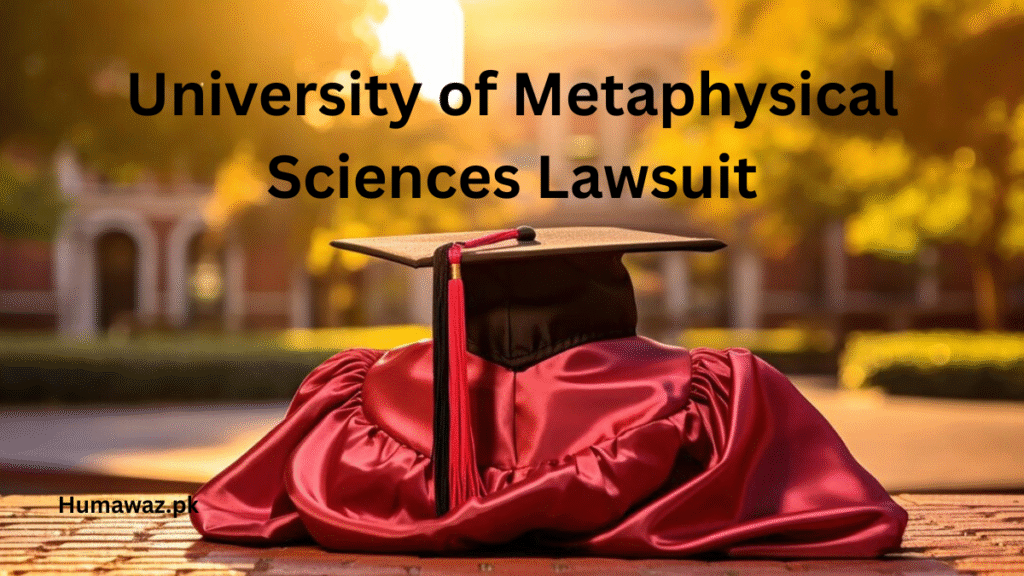The University of Metaphysical Sciences lawsuit has sparked significant interest among students, professionals, and anyone involved in the metaphysical community. Understanding the details of this case is important, especially for those considering enrollment or currently affiliated with the institution.
In this article, we will explore the background of the University of Metaphysical Sciences (UMS), the nature of the lawsuit, key issues raised, outcomes so far, and what it all means for current and prospective students. Whether you’re researching educational options or simply curious about the metaphysical field, this guide provides a clear and detailed overview.
What Is the University of Metaphysical Sciences?
The University of Metaphysical Sciences (UMS) is an institution offering degrees in metaphysical subjects such as spiritual healing, metaphysics, meditation, and holistic studies. Founded with the goal of making spiritual education accessible to all, UMS has gained a large following among individuals seeking non-traditional educational paths.
UMS provides distance learning programs, offering bachelor’s, master’s, and doctoral degrees in various metaphysical disciplines. The programs are designed to be affordable and flexible, making it attractive to working adults and lifelong learners.
Understanding the University of Metaphysical Sciences Lawsuit
Background of the Lawsuit
The lawsuit involving the University of Metaphysical Sciences revolves around questions related to accreditation, degree legitimacy, and consumer protection. Some former students and critics raised concerns about the value and recognition of the degrees awarded by UMS.
While UMS maintains that it offers a genuine metaphysical education, lawsuits have been filed questioning whether the university misled students about the credibility and acceptance of its degrees in professional settings.
Main Allegations
The primary allegations in the University of Metaphysical Sciences lawsuit include:
- Misrepresentation of Accreditation: Some plaintiffs claim that UMS did not clearly explain that it is not accredited by traditional, government-recognized accrediting bodies.
- Consumer Deception: Allegations that the institution marketed its degrees in ways that led students to believe they would have broader acceptance in professional fields.
- Financial Disputes: Some students requested refunds after realizing the degrees were not accepted for licensing in certain careers.
These allegations center on consumer rights and transparency in educational marketing.
The University’s Response
The University of Metaphysical Sciences has defended itself by stating that it has always been clear about its status. On its website and in its materials, UMS emphasizes that it is a religious-exempt educational institution, offering degrees primarily for personal spiritual development rather than professional licensure.
UMS argues that students are informed about its accreditation status before enrollment and that its programs are intended for those who understand the non-traditional nature of metaphysical education.
Key Issues Surrounding the Lawsuit
Accreditation and Recognition
One of the biggest issues in the University of Metaphysical Sciences lawsuit is accreditation. Accreditation matters because it often affects whether degrees are recognized by employers, licensing boards, and other institutions. UMS is accredited by a private body that specializes in religious and metaphysical education but is not recognized by the U.S. Department of Education.
This distinction is crucial for students seeking credentials that would allow them to work in certain regulated professions.
Transparency and Marketing
Critics argue that UMS’s marketing materials were not sufficiently clear about the limitations of its degrees. While some prospective students understood that a metaphysical degree was primarily for personal or religious use, others believed they would be able to pursue professional counseling or therapy licenses, leading to dissatisfaction and legal action.
Impact on Students
Students affected by the lawsuit report feeling misled and financially burdened. Many paid thousands of dollars expecting professional benefits that did not materialize. The lawsuit seeks remedies including tuition reimbursement, clearer disclosures, and changes to marketing practices.
What This Means for Current and Future Students
Due Diligence Before Enrolling
Anyone interested in enrolling in a metaphysical education program should do thorough research. Here are some key tips:
- Verify Accreditation: Understand what type of accreditation the institution has and what it means for your career goals.
- Clarify Career Outcomes: Ask whether the degree will qualify you for the type of work you want to pursue.
- Read Reviews and Testimonials: Look at both positive and negative experiences shared by alumni.
Taking these steps can help you make an informed decision and avoid misunderstandings.
Educational Value of UMS Degrees
Despite the controversy, many students have found personal value in degrees from the University of Metaphysical Sciences. For those pursuing metaphysical studies for personal growth, ministry, or non-licensed holistic practices, UMS offers an affordable and flexible education.
It’s important, however, to be clear about your goals and ensure that the program you choose aligns with them.
Expert Insights on Non-Traditional Education
Experts emphasize that non-traditional education, including metaphysical studies, plays an important role in serving diverse learning needs. However, transparency is critical.
According to an article from Inside Higher Ed (source), students must be especially careful with institutions that operate outside the traditional accreditation system. Verifying credentials, reading enrollment agreements carefully, and understanding limitations are vital to a positive educational experience.
Conclusion
The University of Metaphysical Sciences lawsuit highlights the importance of transparency, accreditation, and informed decision-making in higher education. While UMS continues to offer programs valued by many for personal development, the lawsuit serves as a cautionary tale for students to thoroughly research any institution before enrolling.
If you are considering metaphysical studies, take time to evaluate your goals, review institutional credentials, and ask detailed questions. Education is an investment in yourself—make sure it’s one that truly serves your future.

